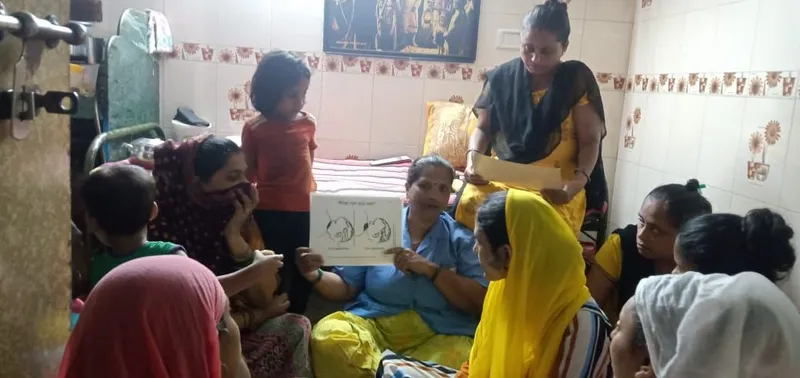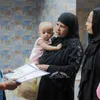This community mobiliser is working to improve the health of women and children in a Dharavi colony
Mayuri Madhukar Shetty is a community mobiliser with non-profit SNEHA. She helps implement its initiatives to better the health of women and children in Kunchi Korve Nagar, a colony in Dharavi, Mumbai.
Kunchi Korve Nagar is a sewage workers’ colony in Dharavi, Mumbai, also infamous as Asia’s largest slum. The colony is mostly dominated by BMC contractual workers involved in sweeping, cleaning of gutter lines, and other sanitation work.
The slum is characterised by marginalised communities, some of them denotified tribes, with little or no education, most often out of place in a bit city like Mumbai.
One of the organisations working in this area is the Society for Nutrition, Education & Health Action (SNEHA), a Mumbai-based non-profit working to improve health, nutrition and safety among marginalised urban slum communities.
SNEHA’s aim is to reduce maternal and new born mortality and morbidity, child malnutrition, adolescent anaemia, and gender-based violence.
Rama Shyam, Director of SNEHA’s Adolescent Health and Sexuality Education programme, explains that in a marginalised society like those existing in Dharavi’s Kunchi Korve Nagar, there are still incidents of child marriage and age-old practices and rules that are detrimental to the physical health of women and children.
SNEHA’s Child Health and Nutrition programme works in partnership with the government’s Integrated Child Development Services (ICDS) to prevent and treat malnutrition in children less than three years of age.
Along with strengthening ICDS implementation, the programme conducts public awareness activities to improve uptake of ICDS services, while promoting good health practices. The work covers 150 anganwadis (child care centres) across vulnerable settlements in Dharavi and Wadala.
As per 2016-2022 data, on an average 6,222 women are served in partnership with ICDS every month.
This is where the concept of a community mobiliser comes in. She is instrumental in implementing project activities in intervention areas, namely the slums SNEHA works in.

Mayuritai meeting women in the area
Primary healthcare for women and children
Rama introduces us to Mayuri Madhukar Shetty, fondly known as Mayuritai (tai is Marathi for sister). Mayuri is the community mobiliser for the Kunchi Korve Nagar area, working with close to 550 women, with one of the focus areas of her work being prenatal care.
During the pandemic, Mayuri played an exceptional role in rallying volunteers for distribution of essentials, allaying fears around the virus, working on already existing initiatives like prenatal care and family planning, and organising group sessions to make people understand the importance of the COVID-19 vaccines.
Until 2011, Mayuri worked as a cook and domestic help in many houses until her sister-in-law introduced her to a support centre for drug addicts in Santa Cruz, Mumbai. She worked from 10 am to 6 pm looking after young children, helping with food, and - at times - aiding counsellors in their tasks.
“After a year, I found it difficult to manage both the job and responsibilities at home. But I knew that the social sector is where I could use my skillsets to the fullest and make an impact. I started looking for jobs in the NGO sector and some friends directed me to SNEHA. I joined the organisation in 2012,” Mayuri tells HerStory.
SNEHA has already been working in the Kunchi Korve Nagar area for the past 20 years, with its initiatives slowly gaining momentum.
Prior to the pandemic, as a community mobiliser, Mayuri was at the forefront of its prenatal and family planning programmes in the area.
During the pandemic, most of Dharavi became a containment zone. Reaching the place was challenging, and migration of workers was also becoming an issue.
“Initially, I rallied the workers by conducting sessions online and made sure our existing initiatives didn’t suffer. We also spearheaded the distribution of ration, fruits, and vegetables because nutrition is very important. Apart from these, we had to make sure that fear of the virus didn’t take over people’s lives. When things began getting better, I started travelling to the area to start awareness and vaccination drives among the Kunchi Korve Nagar population,” Mayuri says.
In her work with over 500 women and children from over 850 households, community organisers like Mayuri put into practice two models of civic engagement from SNEHA, both direct and indirect.
Rama elaborates, “SNEHA employs community organisers who visit every home in the slum for menstrual surveys so that pregnant women can brought into the initiative’s fold – this is direct intervention. The second is including people from the slum as volunteers and equipping them with the right skillsets and information, so that they can also be part of the solution.”
She also points to the National Family Health Survey, which indicates that anemia, especially in pregnant women, is rampant all over the country.
Kunchi Korve Nagar is no exception.
Women who are pregnant are encouraged to register themselves at the Urban Health Center (UHC) in the area. In the first three months of pregnancy, they are given folic acid tablets and at a later stage, iron and folic acid tablets are administered. Women who show hesitation at the initial stages to avail these medicines are provided counselling as well. Regular health check-ups are also provided at the UHC.
Awareness about rights
Mayuri works with her band of 14 volunteers in Kunchi Korve Nagar and is slowly seeing change happening.
“We emphasise on the need for early intervention through early registration. Women were hesitant earlier, but they now send their daughters and daughters-in-law. This has ensured the right pre and post-natal nutrition. Community volunteers also help anganwadi sevikas to monitor the height and weight of children, and the upper arm and mid-arm circumference to see if there are any signs of malnourishment.”
Mayuri also works to ensure that there is no vaccine hesitancy when it comes to children and regularly organises camps for this purpose.
The lack of toilets inside the house, unhygienic public toilets, and access to potable water are other issues residents face. Sporadic incidents of violence and unemployment also mar the development of its people, and impact women and children the most, Mayuri says.
“To this end, SNEHA works with adolescents and youth in the area to educate them on citizenship and civic issues. We tell them how to make their voices heard and fight for their basic rights,” she says.
SNEHA has also collaborated with the COVID Action Collab, an all-India collaborative to provide relief, recovery and build resilience among the most vulnerable communities to support and strengthen the existing Public District System (PDS) so that service delivery is more effective.
The partnership introduced SNEHA to the adoption of social protection and helped expand its work beyond the PDS system.
Mayuritai, meanwhile, continues relentlessly with her work to introduce and implement SNEHA’s efforts for healthier women and children in Kunchi Korve Nagar.
`
Edited by Teja Lele








